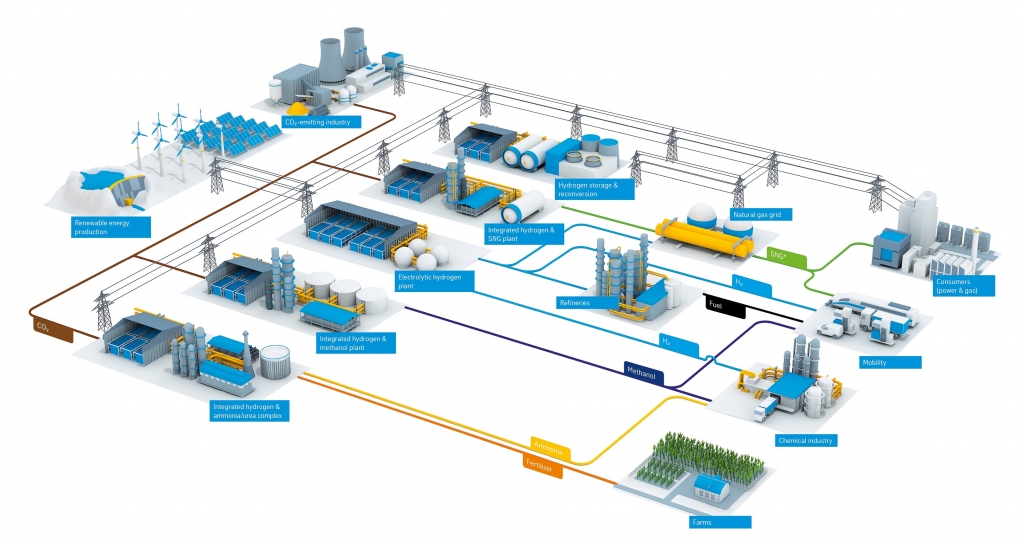
Key to a sustainable future: thyssenkrupp launches advanced water electrolysis for large scale chemical projects in Saudi Arabia
As renewable energy sources continue their global success story, the demand for integrating them into the current energy and industry landscape has seen a sharp rise in Saudi Arabia. thyssenkrupp now offers a key technology for renewables integration: industrial scale water electrolysis for large projects in Saudi Arabia. By splitting water into hydrogen and oxygen, this technology delivers “green” hydrogen, a clean, CO2-free energy carrier. The only inputs needed are water and renewable electricity from wind, hydro power or photovoltaics. “Green” hydrogen production is ideal for long-term energy storage, hydrogen mobility and other applications, making optimal use of renewable energy sources.
Based on worldwide leading electrolysis technologies, experts from thyssenkrupp have developed a solution which makes large-scale hydrogen production from electricity economically attractive. The advanced water electrolysis features a well-proven cell design paired with an especially large active cell area of 2.7 m2. By further optimizing the proven “Zero-Gap” electrolysis technology (leaving virtually no gap between membrane and electrodes), very high efficiencies of more than 82% are achieved.
As Saudi Arabia is eyeing sustainability in the Kingdom’s vision 2030 with a focus to reduce oil dependency in the country and be sustainable without it by 2020, the offering of industrial scale water electrolysis for large projects and how it offers economical industrial-scale hydrogen plants for energy storage will positively, impact sustainability in the Kingdom’s industrial solutions.
This innovation comes as a game changer and reflects thyssenkrupp’s commitment to support the Kingdom’s vision 2030 to raise the share of non-oil exports in non-oil GDP from 16% to 50%, increase non-oil government revenue from SAR163bn to SAR1tn, localize renewable energy, industrial equipment sectors and generate 9.5 gig watts of renewable energy.
The Kingdom of Saudi Arabia is an important focus of thyssenkrupp’s business operations due to its economic power and capabilities and for its continuing industrial development.
thyssenkrupp has been present in the Kingdom of Saudi Arabia for more than 60 years and we are proud of our long-lasting and strong ties to the country and its people. Since then, we have continuously work closely with our customers to supply tailored, turnkey plants and components for customers in the chemical, fertilizer, cement, oil and gas, mining and steel industries, based on our more than 200 years of experience.
Sami Pelkonen, CEO of the Electrolysis & Polymers Technologies business unit at thyssenkrupp Industrial Solutions: “With our water electrolysis process, we have successfully brought a technology to market maturity which is of major significance for the energy transition. We are now able to offer our customers a wealth of sustainable solutions which will help to bridge the gap between renewable energy production and consumption. Green hydrogen as a clean, CO2-free starting point can be used in a variety of ways: for energy storage, mobility, and the production of sustainable chemicals.”
New, cost-efficient plant type for “green” hydrogen projects
To make deployment of large hydrogen projects as easy as possible, the thyssenkrupp technology is available in pre-fabricated, skid mounted standard modules. They easily add up to the desired project size, potentially into the hundreds of megawatt range. The patented design is based on thyssenkrupp’s well proven, leading electrolysis technologies. To date, the Group company thyssenkrupp Uhde Chlorine Engineers has successfully completed more than 600 electrochemical plants worldwide.
“Based on decades of experience in developing and building electrolysis plants, we have designed our product to meet our client’s most important demands: easy to deliver and install, highly efficient, with minimized investment and operation cost. And we have an industrial-scale supply chain of 600 MW per year already in place”, says Roland Käppner, Head of Energy Storage and Hydrogen at thyssenkrupp Uhde Chlorine Engineers.
Within the Carbon2Chem® project, one of the global flagship projects for carbon-neutral value chains, the advanced alkaline water electrolysis by thyssenkrupp was already commissioned successfully. It will provide the necessary hydrogen for producing chemicals from steel plant flue gas.
Turning energy into sustainable chemicals
Hydrogen is not only a clean energy carrier, be it for long-term energy storage in the gas grid, or for clean fuels e.g. for fuel cell mobility. When produced from renewable energy, it can make the production of key chemicals sustainable. One good example is “green” ammonia: With the water electrolysis technology and its world-class ammonia process, thyssenkrupp can deliver integrated plants which can produce ammonia from nothing but water, air and sunlight or wind. The ammonia can be further processed into fertilizers.
As a specialist in chemical plant engineering and construction, thyssenkrupp can realize additional value chains, e.g. for “green” methanol, which can enable carbon recycling to generate sustainable fuel. Further “power-to-gas” solutions include methanation for the production of synthetic natural gas (SNG). As the starting point for all these solutions, water electrolysis by thyssenkrupp can help to convert today's carbon-based industry into a more sustainable, climate-friendly one.


























